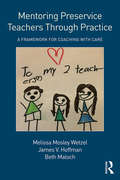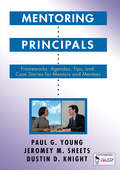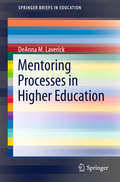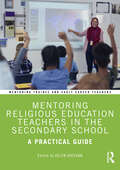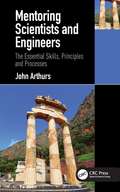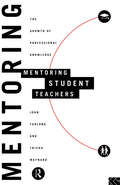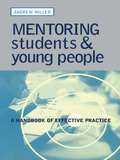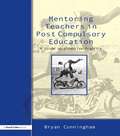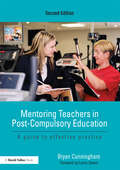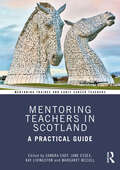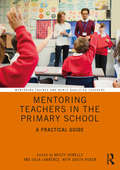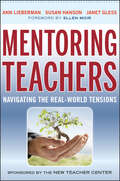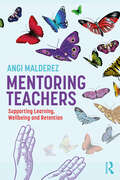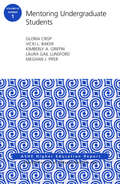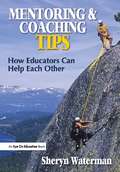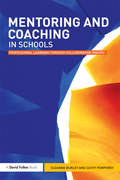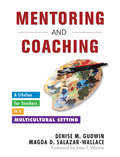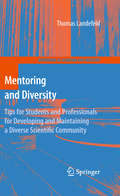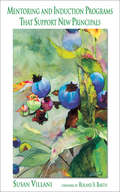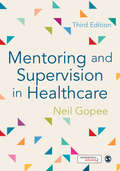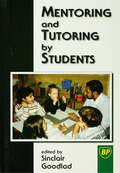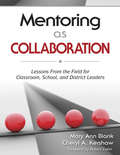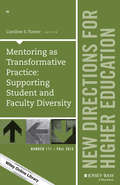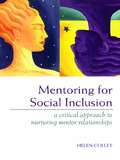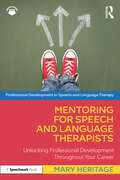- Table View
- List View
Mentoring Preservice Teachers Through Practice: A Framework for Coaching with CARE
by James V. Hoffman Melissa Mosley Wetzel Beth MalochSupporting and challenging cooperating teachers to grow in their mentoring and coaching practices with preservice teachers and also in their own work as classroom teachers, this practical guide presents and illustrates the Coaching with CARE model—a framework for reflection and action that helps cultivate a perspective on teaching that puts students at the center of teacher preparation and places value on apprenticeship and participation in learning. The CARE model takes a turn away from traditional evaluation-based "training" approaches, offering a way for cooperating teachers, and facilitators and university teacher educators who work with them, to come together to shape innovative coaching and mentoring experiences for preservice teachers. Mentoring Preservice Teachers Through Practice, building on the authors’ own work with cooperating teachers, is based on the most recent research on learning to teach and supporting preservice teachers and grounded in the realities of teacher education today. Each chapter includes questions for discussion and suggested readings that can be used to explore the focus of the chapter more deeply as well as relevant research reports published by the authors.
Mentoring Principals: Frameworks, Agendas, Tips, and Case Stories for Mentors and Mentees
by Paul G. Young Mr Jeromey M. Sheets Mr Dustin D. KnightThis indispensable handbook for mentors, mentees, and new principals will jump-start the learning process of new principals by providing case stories and wisdom from leading mentors across the country.
Mentoring Processes in Higher Education
by Deanna M. LaverickThis book portrays the various ways in which mentoring occurs in higher education. Targeting the stakeholders who benefit from mentoring, namely faculty, graduate and undergraduate students, and their professional colleagues, this book supports those who are involved in the mentoring process. It synthesizes the professional literature on mentoring and shares examples of effective practices that address the needs of mentors and their protégés. The book describes mutual benefits of mentoring, along with the characteristics of effective mentors and the ways in which they may support their protégés. The relationships discussed in Mentoring Processes in Higher Education surround mentoring new faculty; peer mentoring for professional development; mentoring through research, scholarship, and teaching opportunities; and mentoring through field experiences, athletics, and student organizations. The book shares the voices of mentors and their protégés as it illustrates how mentoring relationships form the basis for reflection, a transaction of ideas, and growth in knowledge and skills to ultimately advance the institution and field through a collaborative environment in which stakeholders thrive and are valued for their contributions. The cyclical effect of positive mentoring is illuminated through real-life examples that show how protégés eventually become mentors in a continual process of support.
Mentoring Religious Education Teachers in the Secondary School: A Practical Guide (Mentoring Trainee and Early Career Teachers)
by Helen SheehanThis book helps mentors working with beginning teachers of religious education to develop their own mentoring skills and provides the essential guidance their mentee needs as they navigate the roller coaster of their first years in the classroom. Offering tried-and-tested strategies, it covers the knowledge, skills and understanding every mentor needs. Practical tools offered include approaches for developing subject knowledge and lesson planning, as well as guidance for the effective use of pre- and post-lesson discussion, observations and target setting to support beginning religious education teachers. Together with analytical tools for self-evaluation, this book is a vital source of support and inspiration for all those involved in developing the next generation of outstanding religious education teachers. Key topics covered include the following: Models of mentoring Your knowledge, skills and understanding as a mentor Developing mentees' religious literacy through classroom practice Supporting the planning of effective and creative RE lessons Developing mentees' knowledge and skills in the RE curriculum Supporting the delivery and evaluation of lessons Observations and pre- and post-lesson discussions and regular mentoring meetings Helping new religious education teachers develop their professional practice. Filled with the key tools needed for the mentor’s individual development, this book offers an accessible guide to mentoring religious education teachers with ready-to-use strategies that support, inspire and elevate both mentors and beginning teachers alike.
Mentoring Scientists and Engineers: The Essential Skills, Principles and Processes
by John ArthursMentoring is very much more than simple one-to-one informal instruction, or what used to be called ‘coaching’. Modern mentoring techniques are modelled on those of executive coaching as well as expert academic tutoring. Mentoring is simple but not necessarily easy. An estimated 40% of all mentoring schemes fail through lack of mentor training and understanding. No great effort is required to study the literature but, for mentoring to be effective, adherence to basic principles and exercising specific skills is absolutely necessary. The book provides an introduction to what we mean by mentoring and its basic skills – skilful questioning, active listening, building trust, self-management and giving advice and feedback. It further covers mentoring principles, how to conduct mentoring sessions and a wide range of practical applications. The final chapter gives the outlines and principles for creating a basic mentoring scheme within an organisational context. This book is written for those practitioners in science, technology, engineering and mathematics, the STEM fields, who have been pitched into the role of mentor without any prior training. Its objective is to alleviate anxiety, frustration and stress caused by not knowing exactly what is expected. In offering an introduction to mentoring it gives practical guidance as a quick and easy read.
Mentoring Student Teachers: The Growth of Professional Knowledge
by John Furlong Trisha MaynardIn the UK and elsewhere, the training of teachers is increasingly seen as a matter of partnership between schools and institutions of higher education. There is thus an urgent need within the profession to define more carefully what the role of teachers acting as mentors should be. Clearly some aspects of professional knowledge can only be acquired from practical experience in school, and this book draws on extensive research on students' school-based learning to isolate and analyse those aspects. Like any form of teaching, mentoring, the authors suggest, must be built on a clear understanding of the learning processes it is intended to support. In this book, they report on their research into the nature of students' school-based learning and what this means for the role of the mentoring.
Mentoring Students and Young People: A Handbook of Effective Practice
by Andrew MillerMentoring is used in a wide range of situations in education: to assist learning; to help weaker students or those with specific learning needs or difficulties; to develop community or business links; to aid the inclusion of pupils otherwise at risk of exclusion; to develop ethnic links; to enable students to benefit from the support of their peers, to name but a few.The development and proliferation of mentoring and mentoring schemes in education over the last few years has been dramatic, and presents teachers, school managers and leaders, as well as mentors themselves with a challenge. This book presents all mentors plus anyone working with young people with an invaluable guide to approaches to mentoring today. It looks at mentoring as a concept, at what mentoring is, how it is done well and how it can be made more effective. Written by a leading expert on mentoring, this practical and relevant handbook is backed up throughout by inspiring and relevant case studies and examples from schools and schemes internationally.
Mentoring Teachers in Post-Compulsory Education: A Guide to Effective Practice
by Bryan CunninghamThis timely new handbook will be an essential read for all college staff who find themselves involved in mentoring trainee teachers in post-compulsory education, either through choice or necessity! Describing all of the expectations, responsibilities and rewards involved in mentoring college teachers in training; the book provides advice and support on: * What to expect as a mentor and what your mentee expects of you! * Organizing and conducting observations * Time management * Using appropriate language with your mentee * What to do when things go wrong! Accessible, practical and supportive, this book will help make mentoring an easier, more enjoyable and ultimately rewarding experience for all new mentors in the post-compulsory workplace. It will also be of great value to both teachers trainers and key staff in colleges, such as staff development managers, who play an important role in overseeing the delivery and quality of mentoring activities.
Mentoring Teachers in Post-Compulsory Education: A guide to effective practice
by Bryan CunninghamThe post-compulsory sector is complex and multifaceted, with highly diverse and sometimes challenging learner groups and subject to change from almost unending shifts in educational policy. Effective mentoring has a crucial role in the initial training of new teachers in the post-compulsory sector offering them the guidance and practical support they need to respond to these challenges. This second edition has been updated to reflect the new LLUK standards, current research and technological advances. Describing all of the expectations, responsibilities and rewards involved in mentoring, the book covers: What to expect as a mentor and what your mentee expects of you The skills, attributes and functions that make an effective mentor Organising and conducting observations Time management What to do when things go wrong Accessible, practical and supportive, this book will help make mentoring an easier, more enjoyable and rewarding experience for all new mentors in the post-compulsory sector.
Mentoring Teachers in Scotland: A Practical Guide (Mentoring Trainee and Early Career Teachers)
by Sandra EadyThis book assists mentors in developing their mentoring skills, offering guidance needed to support the development of beginning teachers in early years, primary and secondary schools in the Scottish education system, as well as supporting all teachers in their career-long professional learning. Based on research and evidence, Mentoring Teachers in Scotland explores and discusses the knowledge, skills and understanding that underpin mentoring that is responsive to individual mentees' needs. The book includes reflective activities to enable mentors to consider the application of mentoring processes in their own practice, as well as case studies and other learning activities. This book is a valuable source of support and inspiration for all those involved in mentoring and sustaining teachers’ professional development at all stages of their career. Key topics explored include: roles and responsibilities of mentors within the Scottish education system, and the Scottish model of teaching and teacher development; developing a mentor–mentee relationship; guiding beginning teachers in Scotland through the mentoring processes; strategies for observation, analysis and reflection on practice; and mentoring for beginning teachers and career-long professional learning. Mentoring Teachers in Scotland offers an accessible and practical guide to mentoring teachers in Scotland that aims to support, inspire and guide mentors and mentees.
Mentoring Teachers in the Primary School: A Practical Guide (Mentoring Trainee and Newly Qualified Teachers)
by Kristy HowellsMentoring Teachers in the Primary School helps mentors of trainee and newly qualified primary school teachers to both develop their own mentoring skills and provide the essential guidance their beginning teachers need as they navigate the roller-coaster of the first years in the classroom. Offering tried and tested strategies based on the best research, it covers the knowledge, skills and understanding every mentor needs. Together with tools for self-evaluation, this book is a vital source of support and inspiration for all those involved in developing the next generation of outstanding teachers. Key topics for primary mentors include: the role of the mentor, mentoring relationships, mentoring in specialist areas, mentoring development. Filled with guidance to support mentors’ own development, as well as the development of beginning primary teachers, Mentoring Teachers in the Primary School is a vital guide for mentors of primary school teachers, both trainee and newly qualified, with ready-to-use strategies that support and inspire mentors.
Mentoring Teachers: Navigating the Real-World Tensions, 1st Edition
by Susan Hanson Ellen Moir Ann Lieberman Janet GlessA useful guide for teacher mentors as they face new and difficult challenges in their work New teachers often struggle to apply their knowledge in real-world settings, and the idea of mentoring these teachers during their first years in the classroom has captured the imagination of schools all over the world. Drawn from the experiences over the last twenty years of the New Teacher Center, the book illuminates the subtleties and struggles of becoming an excellent, effective mentor. The book discusses the five big tensions of mentoring: developing a new identity, developing trusting relationships, accelerating teacher growth, mentoring in challenging contexts, and learning leadership skills. Describes in-depth the most common challenges of the mentor role A wonderful guide for both new and veteran mentors Includes engaging firsthand narratives written by mentors working in a variety of settings This book is from the New Teacher Center, an organization whose highly respected mentor training model has served over 50,000 teachers nationwide. The New Teacher Center is dedicated to improving student learning by accelerating the effectiveness of teachers and school leaders through comprehensive mentoring and professional development programs.
Mentoring Teachers: Supporting Learning, Wellbeing and Retention
by Angi MalderezMentoring Teachers provides practical guidance for teacher mentors, directly addressing common queries and concerns they may have while acting as a mentor within a diverse range of educational contexts. Drawing upon the author’s 30 years of conducting research on mentoring and working with both experienced and new mentors, this essential book provides a detailed picture of the mentoring role. Dividing the mentor role into five key aspects (Support, Acculturator, Model, Sponsor and Educator), this important resource provides step-by-step descriptions of managing mentorials in ways which: support the mentor in scaffolding a mentee’s thinking so that they can make their own informed judgements and decisions about teaching; develop the mentee’s noticing skills for responsive, adaptive teaching; guide the mentee towards recognising the relevance of others’ ideas or ‘theories’ to their own practice and experience; leave the mentee with practical ideas and plans for teaching and developing their teaching skills; and scaffold the mentee’s learning of Systematic Informed Reflective Practice (SIRP) to support their ongoing learning and development by themselves. Mentoring can, if effective, contribute to mentees’ learning, wellbeing and retention in the profession. Mentoring Teachers describes effective mentoring practice and is a crucial read for any mentor, aspiring mentor or mentor programme co-ordinator.
Mentoring Undergraduate Students: ASHE Higher Education Report, Volume 43, Number 1 (J-B ASHE Higher Education Report Series (AEHE))
by Kimberly A. Griffin Vicki L. Baker Laura Gail Lunsford Meghan J. Pifer Gloria CrispTake a critical look at the theory and recent empirical research specific to mentoring undergraduate students. This monograph: Explains how mentoring has been defined and conceptualized by scholars to date, Considers how recent mentoring scholarship has begun to distinguish mentoring from other developmental relationships, Synthesizes recent empirical findings, Describes prevalent types of formalized programs under which mentoring relationships are situated, and Reviews existing and emerging theoretical frameworks. This monograph also identifies empirical and theoretical questions and presents research to better understand the role of mentoring in promoting social justice and equity. Presenting recommendations for developing, implementing and evaluating formal mentoring programs, it concludes with an integrated conceptual framework to explain best-practice conditions and characteristics for these programs. This is the first issue of the 43rd volume of the Jossey-Bass series ASHE Higher Education Report. Each monograph is the definitive analysis of a tough higher education issue, based on thorough research of pertinent literature and institutional experiences. Topics are identified by a national survey. Noted practitioners and scholars are then commissioned to write the reports, with experts providing critical reviews of each manuscript before publication.
Mentoring and Coaching Tips: How Educators Can Help Each Other
by Sheryn Spencer-WatermanThis book is for educators at all levels and is packed with creative, use-now tips and activities to support new and struggling teachers. Combining real-life scenarios with current research, the author demonstrates how educators can get the most out of available resources, promote a school culture devoted to helping and caring, and meet common school challenges head-on! New and noteworthy—by providing creative activities and acknowledging the complexity inherent in school culture, this practical guide can really help educators implement a mentoring/coaching program that works!
Mentoring and Coaching in Schools: Professional Learning through Collaborative Inquiry
by Suzanne Burley Cathy PomphreyCan mentoring and coaching really improve professional practice? How can research and inquiry improve mentoring and coaching practice? Mentoring and Coaching in Schools explores the ways in which mentoring and coaching can be used as a dynamic collaborative process for effective professional learning. It demonstrates how the use of practitioner inquiry within mentoring and coaching relationships in schools results in professional learning which is both transformative and empowering for teachers. The book sets out a new model for mentoring and coaching which is centred on a process of critical inquiry and shows teachers how they can use this model to carry out their own collaborative inquiries. Features include: reflective questions, guidelines, task and templates to help collect evidence and evaluate inquiries detailed case studies focusing on teachers at different stages in their career practical guidance on carrying out practitioner inquiry and research an analysis of learning outcomes resulting from different coaching and mentoring relationships. This timely text will be valuable reading for coaches and mentors in secondary schools, teachers undertaking continuing professional development and students on coaching and mentoring courses.
Mentoring and Coaching: A Lifeline for Teachers in a Multicultural Setting
by Denise M. Gudwin Magda D. Salazar-WallaceHelp new teachers thrive in culturally and linguistically diverse school settings! Drawing from their own personal and professional experience, the authors offer practical examples of how mentors can help novice teachers navigate the challenges of teaching in a culturally and linguistically diverse (CLD) school. Filled with vignettes that capture the real-life experiences of new teachers and their mentors, this book: Illustrates how to develop effective teacher-to-teacher mentoring relationships Raises readers’ awareness of issues that might arise from CLD differences and facilitates more effective communication Offers reproducible resources, agendas, and other sample materials for a variety of contexts
Mentoring and Diversity
by Thomas LandefeldThis book will provide basic guidelines for facilitating the educational advancement of under represented students in the sciences, not only from the student perspective but also from the perspective of faculty advisors/mentors. Although the proper mentoring and advising of students about careers and preparation for the education and training associated with them is one of the most important components of a student's education process, this aspect has been severely lacking in academia in the past as well as the present. This is particularly the case with under represented ethnic minorities, despite the fact that mentoring of minority students has been identified as probably the most effective means for assisting them in achieving success. There are a multitude of reasons for this deficiency, including not enough mentors, students not "reaching out", lack of resources as well as other societal and academic limitations. This book provides tips to help guide a student on choosing mentors, what to expect from mentoring, and effectively developing a strong personal portfolio. Tips are also provided to scientists and faculty on being an effective mentor. The emphasis of the book will be primarily on students of color in the sciences, who are severely under represented, and will be presented in a "guidebook" format to simplify the process as much as possible.
Mentoring and Induction Programs That Support New Principals
by Susan VillaniThis insightful resource examines how well new principals are prepared and supported, reviews numerous model programs, and offers innovative solutions to develop a mentoring or induction program.
Mentoring and Supervision in Healthcare
by Neil GopeeGopee (health and life sciences, Coventry U. , UK), who has worked in adult and mental health nursing, explores the standards, competencies, and outcomes for effective mentoring in nursing, midwifery, and other healthcare professions based on the UK's Nursing and Midwifery Council Standards to Support Learning and Assessment in Practice. He focuses on eight domain areas identified in the document and the outcomes for mentors, as he compares their role to others (such as clinical supervisors or practice education facilitators) and discusses key factors, personal and professional attributes, and the effects of poor mentoring. He describes how learning occurs and is facilitated; effective learning environments; activities such as evidence-based practice, research implementation, practice development, and management of change; assessing students' clinical competence; leadership; and the evaluation of mentoring. Annotation ©2012 Book News, Inc. , Portland, OR (booknews. com)
Mentoring and Tutoring by Students
by Sinclair GoodladSchemes involving students as tutors are in place in many countries. This work aims to stimulate and encourage the use of an educational technique through which teachers in tertiary and secondary education can amplify and extend their influence - through the deployment of students as tutors.
Mentoring as Collaboration: Lessons From the Field for Classroom, School, and District Leaders
by Mary Ann Blank Cheryl A. KershawSchool and district leaders will discover how to develop, assess, and sustain a collaborative, team-based mentoring program that helps retain new teachers and improve student achievement.
Mentoring as Transformative Practice: New Directions for Higher Education, Number 171 (J-B HE Single Issue Higher Education)
by Caroline S. TurnerScholars examining how women and people of color advance in academia invariably cite mentorship as one of the most important factors in facilitating student and faculty success. Contributors to this volume underscore the importance of supporting one another, within and across differences, as critical to the development of a diverse professoriate. This volume emphasizes and highlights: the importance of mentorship; policies, processes, and practices that result in successful mentoring relationships; real life mentoring experiences to inform students, beginning faculty, and those who would be mentors; and lievidence for policy makers about what works in the development of supportive and nurturing higher education learning environments. The guiding principles underlying successful mentorships, interpersonally and programmatically, presented here can have the potential to transform higher education to better serve the needs of all its members. This is the 171st volume of the Jossey-Bass quarterly report series New Directions for Higher Education. Addressed to presidents, vice presidents, deans, and other higher education decision makers on all kinds of campuses, it provides timely information and authoritative advice about major issues and administrative problems confronting every institution.
Mentoring for Social Inclusion: A Critical Approach to Nurturing Mentor Relationships
by Helen ColleyWhat does mentoring really mean? What can be achieved through mentor relationships?This timely book examines one of the fastest growing social movements of our time. As millions of volunteers worldwide continue to add to the mentoring phenomenon, the need for this authoritative text becomes increasingly evident. It capably traces the history of mentoring, unravelling the many myths that surround it, with a combination of intellectual rigour, insight and lucid discussions.The author draws upon detailed case studies, providing a unique and vivid account of mentoring through the voices of the participants themselves. These eye-opening narratives reveal the complex power dynamics of the mentor relationship, giving the reader the chance to:* Contextualise mentoring against the background policy driven schemes and social inequalities;* Look beyond the popular myths of self-sacrificing and devoted mentors, and understand the emotional cost of mentoring;* Appreciate young people's view of mentoring and recognise the benefits and the counterproductive outcomes it can produce; * Reflect on a range of models of mentoring, and consider policies to support good practice.The strength of this book lies in the author's ability to present complex material in a highly readable form. It offers a radically new theoretical analysis of mentoring, based on award-winning research, arguing that mentoring cannot be separated from the wider power relations that surround those involved. For anyone with a professional commitment or link to mentoring, including managers, practitioners and policy-makers, this is an essential, incomparable read.
Mentoring for Speech and Language Therapists: Unlocking Professional Development Throughout Your Career (Professional Development in Speech and Language Therapy)
by Mary HeritageIn this book, Mary Heritage shows how mentoring can have a powerful impact on the speech and language therapist and their professional development. The text sets out the impact of mentoring at each stage of the speech and language therapist’s career – students, novice practitioners, and leaders – and explores how mentoring is distinct from other supportive relationships that are available, such as counselling, coaching line management, and education. The reader is guided through the process of finding a mentor and making the most of the mentoring relationship. The book goes on to outline what makes a good mentor and concludes with a vision and call to action for the profession to embrace mentoring more widely, with particular focus on creating a more inclusive professional community.Each section concludes with a space for reflection and action planning to guide the reader through their own journey of understanding how to use mentoring to unlock their own professional development needs.This resource is relevant for all speech and language therapists: those embarking on a new career in speech and language therapy, those needing guidance at a career crossroads, leaders looking to develop a workforce, and those wishing to diversify their communication skills to support their colleagues.
